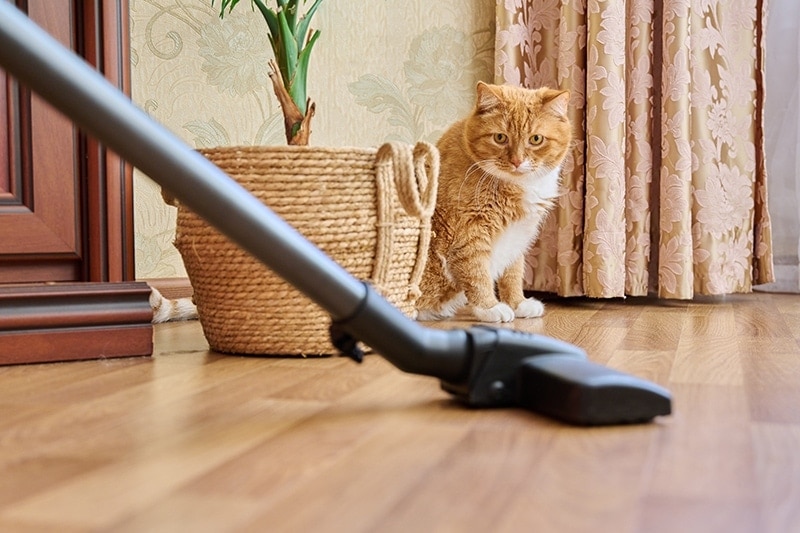
Almost every home relies on the vacuum cleaner, especially those homes with cats and the hair, cat litter, and other detritus that accompany them. But many cat owners will have experienced the abject fear that the humble vacuum cleaner holds over their cat.
While it might seem odd to be afraid of the vacuum cleaner, there are good reasons. For a start, cats have very sensitive hearing, and the vacuum is loud. For a lot of cats, the vacuum is somewhat alien to them, and if they have been startled by the vacuum the first few times they have experienced it, this will manifest itself as fear.
It may be possible to calm your cat or at least lessen the impact that vacuuming has on your cat. Below we look at the reasons cats are scared of vacuum cleaners, as well as some methods to help overcome the problem.
Why Are Cats Scared of Vacuums?
Although they have been domesticated for thousands of years, pet cats have evolved from wild cats. In the wild, they would not have come across anything like a vacuum, so they aren’t prepared for this type of encounter. As such, they will base their reaction to a vacuum on previous encounters, or they will naturally be afraid of what is a loud noise-making machine.
1. Loud Noise
Even to humans, some vacuum cleaners are extremely loud. Cats have more sensitive hearing than people, so they are hearing a really loud noise that doesn’t sound like anything they are used to. In short, the vacuum is scary because it is loud.
2. Lack of Exposure
The socialization window for a cat occurs when it is 2 to 8 weeks old when the kitten is still with its mother. If a cat was exposed to the sound and motion of a vacuum during this time, it may have gotten used to the noise. On the other hand, kittens take their cues from their mothers at this age, and if a young kitten saw its mum being scared by a vacuum, it would instinctively see vacuums as threats.
Image Credit: one photo, Shutterstock
3. Negative Encounters
Cats have good memories, and they use their memory to aid in their survival. If they have encountered vacuums in the past and were startled by their first encounters, the cat will remember the experience and will likely be scared of vacuums in the future.
How to Get Your Cat Used to a Vacuum
Ideally, you should start preparing your cat for life with a vacuum when it is still a kitten. Take things slowly, let it get used to the vacuum before you turn it on, and avoid startling or making the kitten jump with the vacuum. If it’s too late for that, you may be able to reduce the level of fear your cat shows, at least, by following these steps.
Give the Vacuum a Familiar Smell
Cats are very scent-oriented animals. They like smells they recognize and can get scared of smells they don’t recognize. Get your cat’s bed or something that it sleeps on regularly and rub it against the vacuum. This will transfer your cat’s smell to the vacuum so hopefully they won’t identify it as being a threat.
Leave the Vacuum Out
Before you first vacuum near your cat, take the vacuum out and lay it on the ground. Let your cat investigate and get used to how it looks and how it smells. If your cat is initially afraid of the vacuum, don’t leave it close to the litter tray, the cat’s food, or anything that the cat needs access to or they may do their business elsewhere or even stop eating.
Image Credit: kholywood, Shutterstock
Start with the Vacuum Laid Flat
As well as being loud, the vacuum can look scary especially when it is stood upright. When you first turn it on, make sure your cat won’t be startled and leave the vacuum lying down. It is less imposing at this level because it is the same height as your cat and won’t bear down on them. Once your cat gets used to it in this position, you can try slowly standing it up.
Don’t Startle Your Cat
Make sure you know where your cat is when you are about to start vacuuming. Avoid turning the vacuum on if the cat is asleep. If you startle them with the sound of the vacuum, not only will that lead to a negative experience, but it will make future efforts with the vacuum even more challenging.
Let Them Hide
Try and provide somewhere for your cat to hide, so that you won’t vacuum. Generally, it is a good idea to provide somewhere on a high surface such as on top of a wardrobe or a top shelf. Put a bed or blanket on the surface and let the cat escape up there when you first get the vacuum out. It won’t prevent your cat from being scared of the vacuum, but it will provide them with a safe haven.
Let Them Out
If your cat is an outdoor cat and petrified of the hoover, consider letting them out and vacuuming at a time when they are outside. Again, this won’t stop them from being scared of the vacuum, but it will prevent them from being petrified and means you can vacuum in peace.
Image Credit: Pixel-Shot, Shutterstock
Start Small
When you do vacuum, keep vacuuming sessions short. You can always finish the job later or the next day. This will give your cat the chance to calm down after what it considers a harrowing experience.
Conclusion
Cats can be brave and seemingly fearless, but even some of the bravest felines become petrified at the merest sight of a vacuum cleaner. Vacuums are big and imposing, loud and obnoxious, especially to the sensitive ears of our feline friends. Take things slowly, don’t just stick the vacuum on and hope your cat gets used to it, and gradually desensitize your pet to the experience.
Featured Image Credit: VH-studio, Shutterstock






